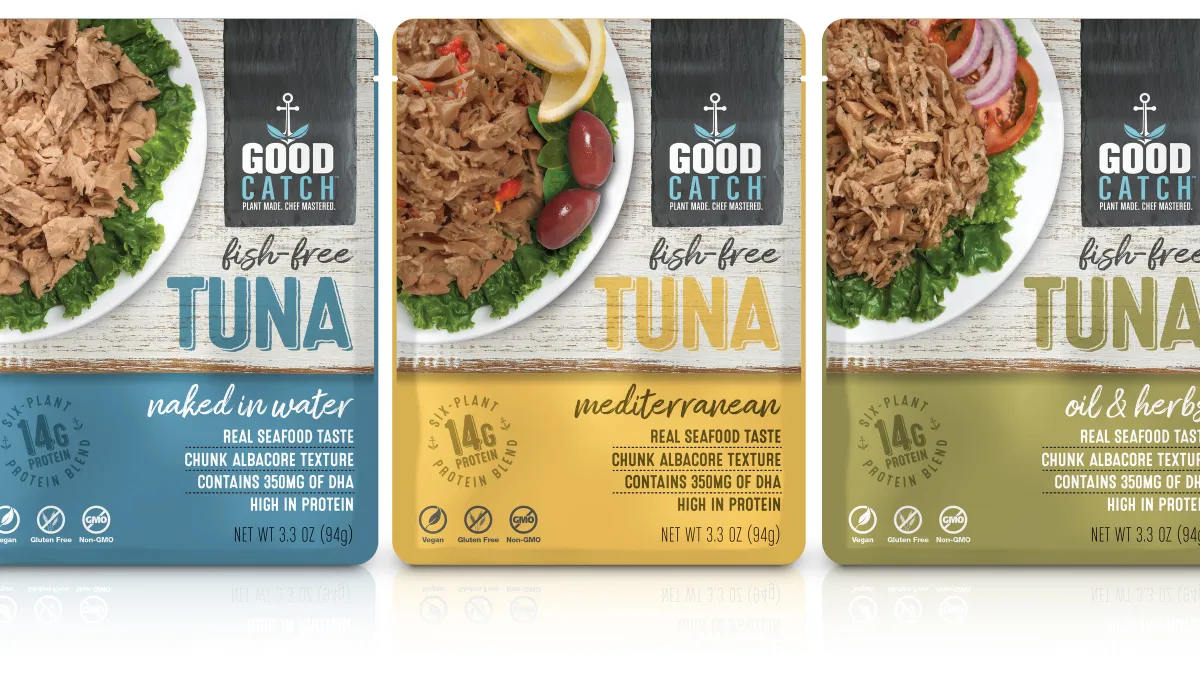Dive Brief:
-
Plant-based tuna from Good Catch Foods will be available this week at Whole Foods Market and Thrive Market outlets nationwide, according to a news release. The two retailers will be the first to carry the shelf-stable product. The ready-to-eat products deliver the flavor and flaky texture of chunk albacore tuna, the company said, and are available in three varieties in 3.3-ounce pouches — Naked in Water, Mediterranean and Oil & Herbs.
-
The New York-based startup said in its statement it is aiming to both appeal to consumers and protect ocean fisheries with its new product. Nearly 90% of the world's marine fish stocks are either overexploited or depleted, Good Catch said, adding that scientists predict global fisheries may totally collapse by 2048.
-
Plant-based tuna avoids the high mercury levels, PCBs, dioxins and other contaminants found in ocean-based fish. It also avoids the diseases and other problems presented by factory fish farming and aquaculture, the company said.
Dive Insight:
Tuna was undoubtedly a deliberate choice for this new plant-based product since it's one of the most popular — and overfished — species in the world, according to Forbes. Good Catch's mission is to disrupt the seafood category with products consumers want without any of the negatives. Company officials claim it is the first plant-based brand that truly rivals real fish.
To make its faux tuna, Good Catch uses a six-plant protein blend made from pea protein isolate, soy protein isolate, chickpea flour, lentil protein, faba protein and navy bean flour. Each serving contains 14 grams of protein, which is about 30% less than real tuna. The new products also contain algal oil for flavor and to provide a plant-based source of omega-3 fatty acids.
Consumers may be more willing to try this plant-based product when they find out it doesn't smell like real tuna. Good Catch examined why people like tuna and found it was the protein, taste and texture — but not how it smells, Chad Sarno, the company's co-founder, executive chef and vice-president of culinary, told Forbes.
That smelly aspect resulted in "workplace shaming" of those bringing tuna into the office, which Sarno said helped drive down traditional tuna sales. The Wall Street Journal recently reported sales of the prepackaged fish dropped 4% in volume from 2013 to 2018. Millennials aren't very interested in canned products, the newspaper noted, and some don't even own can openers — hence today's increasingly common pouch packaging.
While the lack of a fishy smell is a marketing plus, Good Catch products will also need to be competitive with conventional tuna on price, taste and texture in order to win over consumers. However, starting off at retail with nationwide distribution at Whole Foods and Thrive Market is a great way to start. These two retailers attract shoppers who are already likely to be interested in plant-based alternatives, and finding Good Catch on the shelf or online at these top natural foods destinations can start the ball rolling to where plant-based tuna may be as common as the real thing at grocers nationwide.
Other companies such as Sophie's Kitchen, Ocean Hugger Foods and Atlantic Natural Foods have already brought plant-based tuna products to market, so Good Catch isn't without competition. The company and its existing competitors are likely to face another challenge later this year when California-based Finless Foods hopes to launch a cell-cultured bluefin tuna in high-end restaurants prior to scaling up production.
These companies face a promising market, though. Dollar sales of plant-based foods jumped by 20% from 2017 to 2018 to reach $3.3 billion, according to the Plant Based Foods Association. Good Catch plans to add to that with some more plant-based launches planned for this fall, including fish-free crab cakes, sliders and burgers.













